

Conducting literature reviews poses challenges for researchers due to the overwhelming volume of information available and the lack of efficient methods to manage and analyze it.
Researchers struggle to identify key sources, extract relevant information, and maintain accuracy while manually conducting literature reviews. This leads to inefficiency, errors, and difficulty in identifying gaps or trends in existing literature.
Advancements in technology have resulted in a variety of literature review tools. These tools streamline the process, offering features like automated searching, filtering, citation management, and research data extraction. They save time, improve accuracy, and provide valuable insights for researchers.
In this article, we present a curated list of the 10 best literature review tools, empowering researchers to make informed choices and revolutionize their systematic literature review process.
Table of Contents
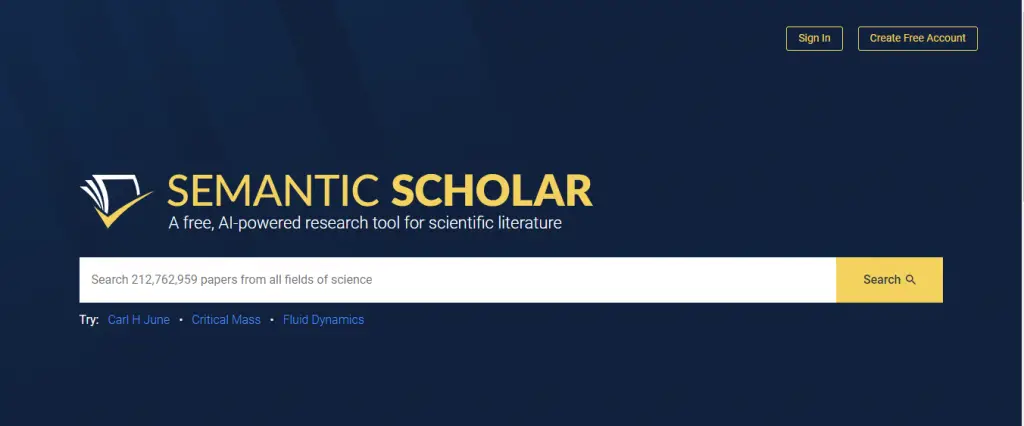
Semantic Scholar is a cutting-edge literature review tool that researchers rely on for its comprehensive access to academic publications. With its advanced AI algorithms and extensive database, it simplifies the discovery of relevant research papers.
By employing semantic analysis, users can explore scholarly articles based on context and meaning, making it a go-to resource for scholars across disciplines.
Additionally, Semantic Scholar offers personalized recommendations and alerts, ensuring researchers stay updated with the latest developments. However, users should be cautious of potential limitations.
Not all scholarly content may be indexed, and occasional false positives or inaccurate associations can occur. Furthermore, the tool primarily focuses on computer science and related fields, potentially limiting coverage in other disciplines.
Researchers should be mindful of these considerations and supplement Semantic Scholar with other reputable resources for a comprehensive literature review. Despite these caveats, Semantic Scholar remains a valuable tool for streamlining research and staying informed.
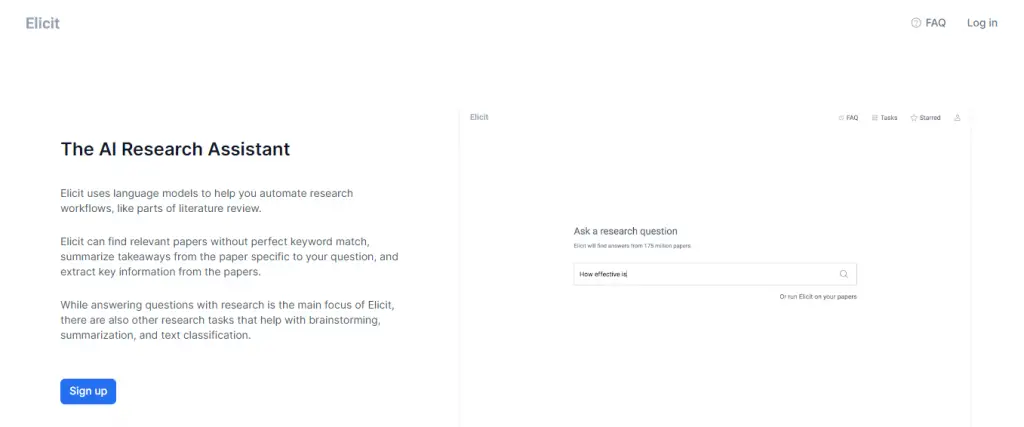
Elicit is a game-changing literature review tool that has gained popularity among researchers worldwide. With its user-friendly interface and extensive database of scholarly articles, it streamlines the research process, saving time and effort.
The tool employs advanced algorithms to provide personalized recommendations, ensuring researchers discover the most relevant studies for their field. Elicit also promotes collaboration by enabling users to create shared folders and annotate articles.
However, users should be cautious when using Elicit. It is important to verify the credibility and accuracy of the sources found through the tool, as the database encompasses a wide range of publications.
Additionally, occasional glitches in the search function have been reported, leading to incomplete or inaccurate results. While Elicit offers tremendous benefits, researchers should remain vigilant and cross-reference information to ensure a comprehensive literature review.
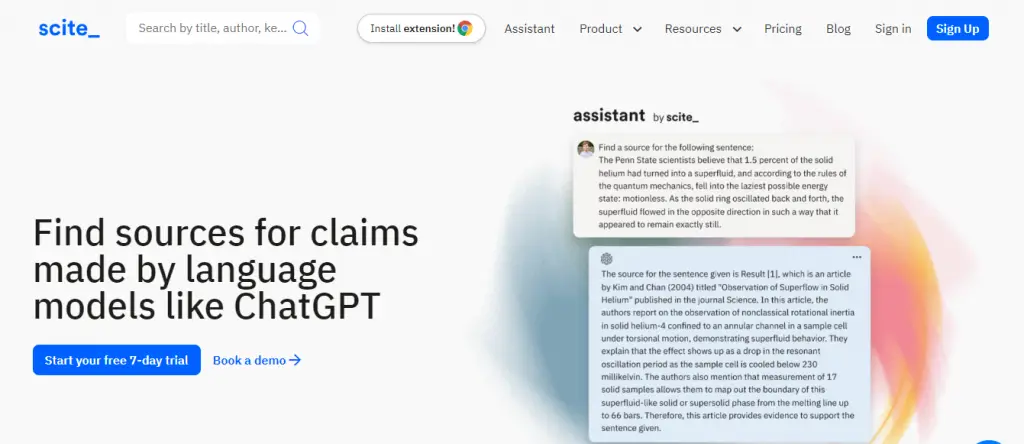
Scite.Ai is a popular literature review tool that revolutionizes the research process for scholars. With its innovative citation analysis feature, researchers can evaluate the credibility and impact of scientific articles, making informed decisions about their inclusion in their own work.
By assessing the context in which citations are used, Scite.Ai ensures that the sources selected are reliable and of high quality, enabling researchers to establish a strong foundation for their research.
However, while Scite.Ai offers numerous advantages, there are a few aspects to be cautious about. As with any data-driven tool, occasional errors or inaccuracies may arise, necessitating researchers to cross-reference and verify results with other reputable sources.
Moreover, Scite.Ai’s coverage may be limited in certain subject areas and languages, with a possibility of missing relevant studies, especially in niche fields or non-English publications.
Therefore, researchers should supplement the use of Scite.Ai with additional resources to ensure comprehensive literature coverage and avoid any potential gaps in their research.
Rayyan offers the following paid plans:
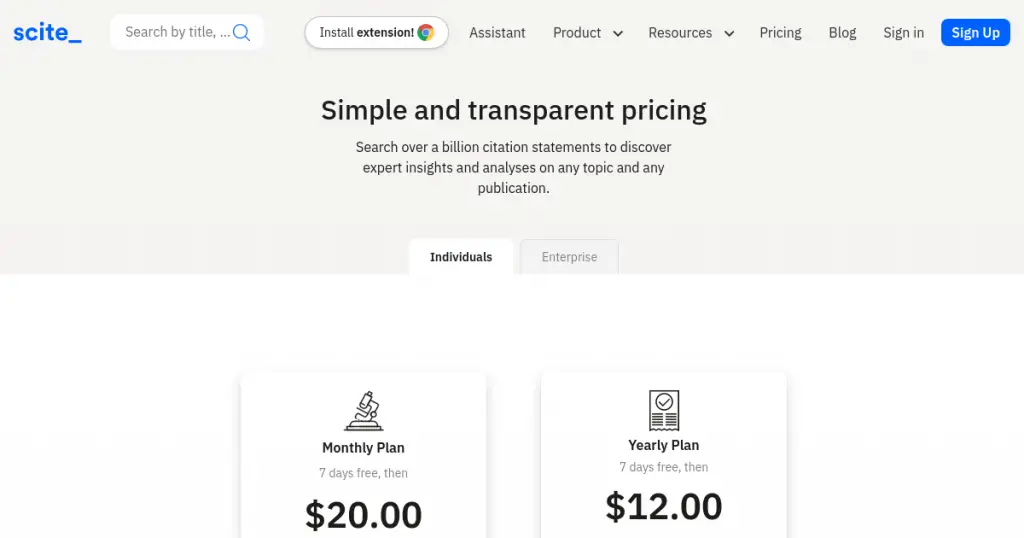
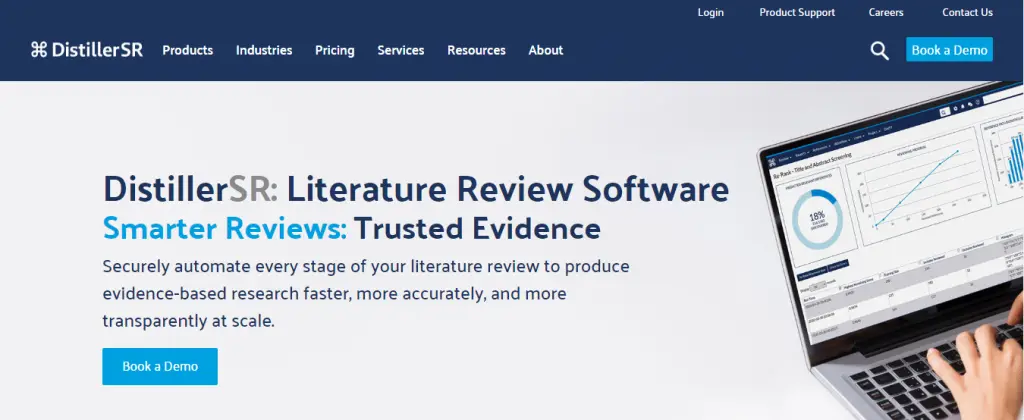
DistillerSR is a powerful literature review tool trusted by researchers for its user-friendly interface and robust features. With its advanced search capabilities, researchers can quickly find relevant studies from multiple databases, saving time and effort.
The tool offers comprehensive screening and data extraction functionalities, streamlining the review process and improving the reliability of findings. Real-time collaboration features also facilitate seamless teamwork among researchers.
While DistillerSR offers numerous advantages, there are a few considerations. Users should invest time in understanding the tool’s features and functionalities to maximize its potential. Additionally, the pricing structure may be a factor for individual researchers or small teams with limited budgets.
Despite occasional technical glitches reported by some users, the developers actively address these issues through updates and improvements, ensuring a better user experience.
Overall, DistillerSR empowers researchers to navigate the vast sea of information, enhancing the quality and efficiency of literature reviews while fostering collaboration among research teams.
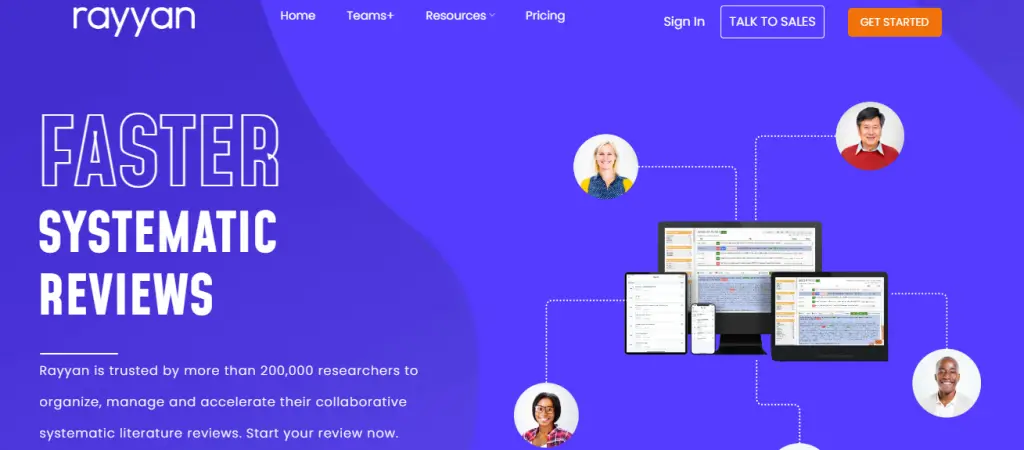
Rayyan is a powerful literature review tool that simplifies the research process for scholars and academics. With its user-friendly interface and efficient management features, Rayyan is highly regarded by researchers worldwide.
It allows users to import and organize large volumes of scholarly articles, making it easier to identify relevant studies for their research projects. The tool also facilitates seamless collaboration among team members, enhancing productivity and streamlining the research workflow.
However, it’s important to be aware of a few aspects. The free version of Rayyan has limitations, and upgrading to a premium subscription may be necessary for additional functionalities.
Users should also be mindful of occasional technical glitches and compatibility issues, promptly reporting any problems. Despite these considerations, Rayyan remains a valuable asset for researchers, providing an effective solution for literature review tasks.
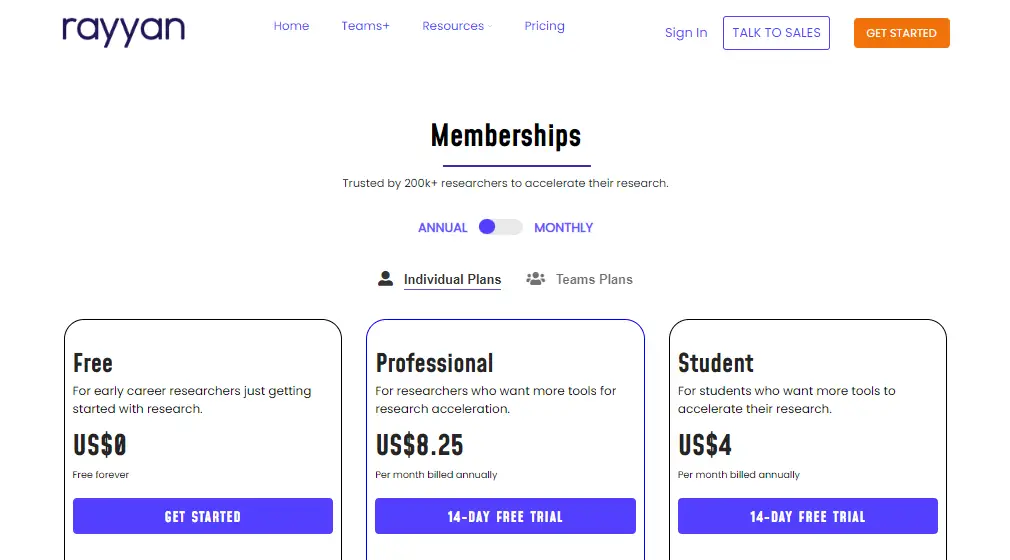
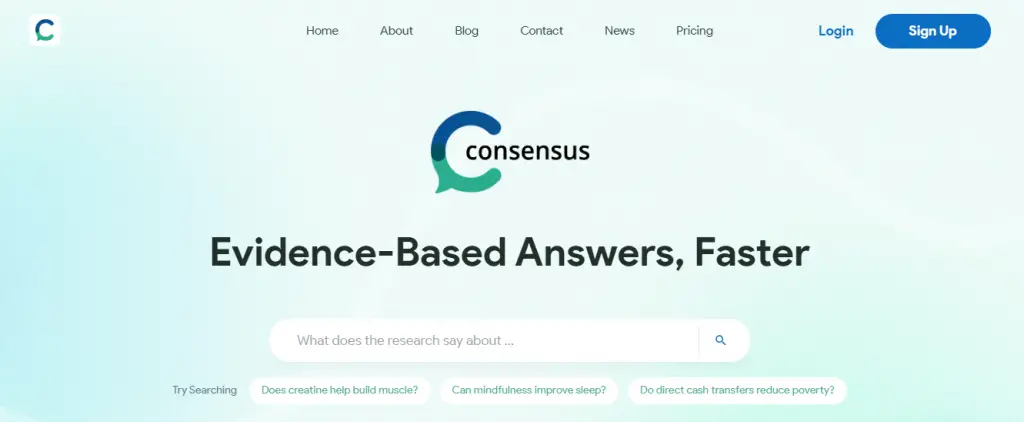
Consensus is a cutting-edge literature review tool that has become a go-to choice for researchers worldwide. Its intuitive interface and powerful capabilities make it a preferred tool for navigating and analyzing scholarly articles.
With Consensus, researchers can save significant time by efficiently organizing and accessing relevant research material.People consider Consensus for several reasons.
Its advanced search algorithms and filters help researchers sift through vast amounts of information, ensuring they focus on the most relevant articles. By streamlining the literature review process, Consensus allows researchers to extract valuable insights and accelerate their research progress.
However, there are a few factors to watch out for when using Consensus. As with any automated tool, researchers should exercise caution and independently verify the accuracy and relevance of the generated results. Complex or niche topics may present challenges, resulting in limited search results. Researchers should also supplement Consensus with manual searches to ensure comprehensive coverage of the literature.
Overall, Consensus is a valuable resource for researchers seeking to optimize their literature review process. By leveraging its features alongside critical thinking and manual searches, researchers can enhance the efficiency and effectiveness of their work, advancing their research endeavors to new heights.
Consensus offers both free and paid plans:

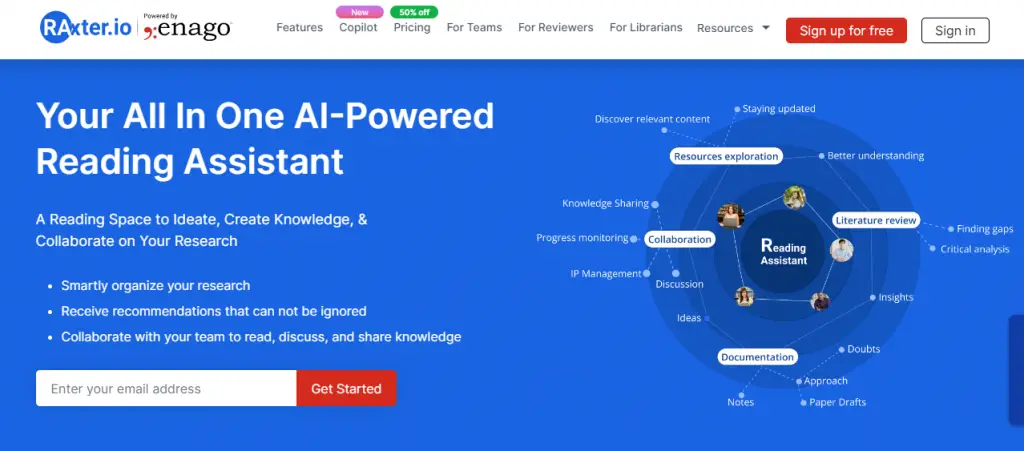
Consensus is a revolutionary literature review tool that has transformed the research process for scholars worldwide. With its user-friendly interface and advanced features, it offers a vast database of academic publications across various disciplines, providing access to relevant and up-to-date literature.
Using advanced algorithms and machine learning, Consensus delivers personalized recommendations, saving researchers time and effort in their literature search.
However, researchers should be cautious of potential biases in the recommendation system and supplement their search with manual verification to ensure a comprehensive review.
Additionally, occasional inaccuracies in metadata have been reported, making it essential for users to cross-reference information with reliable sources. Despite these considerations, Consensus remains an invaluable tool for enhancing the efficiency and quality of literature reviews.

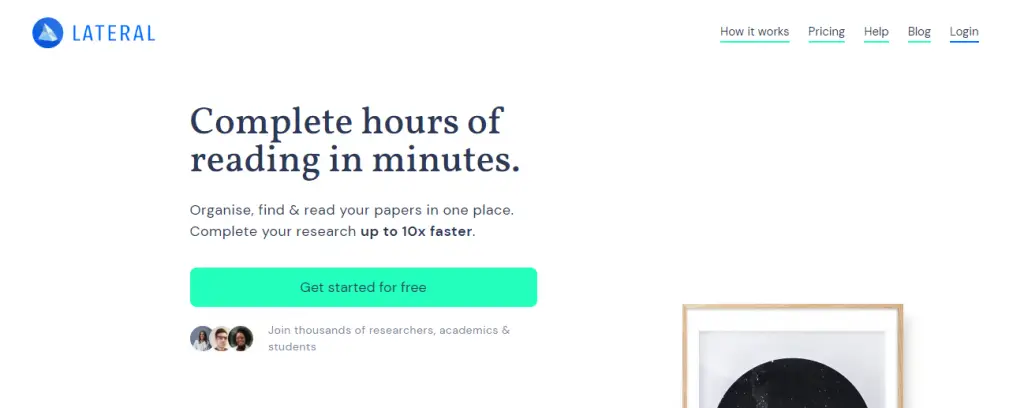
“Lateral” is a revolutionary literature review tool trusted by researchers worldwide. With its user-friendly interface and powerful search capabilities, it simplifies the process of gathering and analyzing scholarly articles.
By leveraging advanced algorithms and machine learning, Lateral saves researchers precious time by retrieving relevant articles and uncovering new connections between them, fostering interdisciplinary exploration.
While Lateral provides numerous benefits, users should exercise caution. It is advisable to cross-reference its findings with other sources to ensure a comprehensive review.
Additionally, researchers must be mindful of potential biases introduced by the tool’s algorithms and should critically evaluate and interpret the results.
Despite these considerations, Lateral remains an indispensable resource, empowering researchers to delve deeper into their fields of study and make valuable contributions to the academic community.
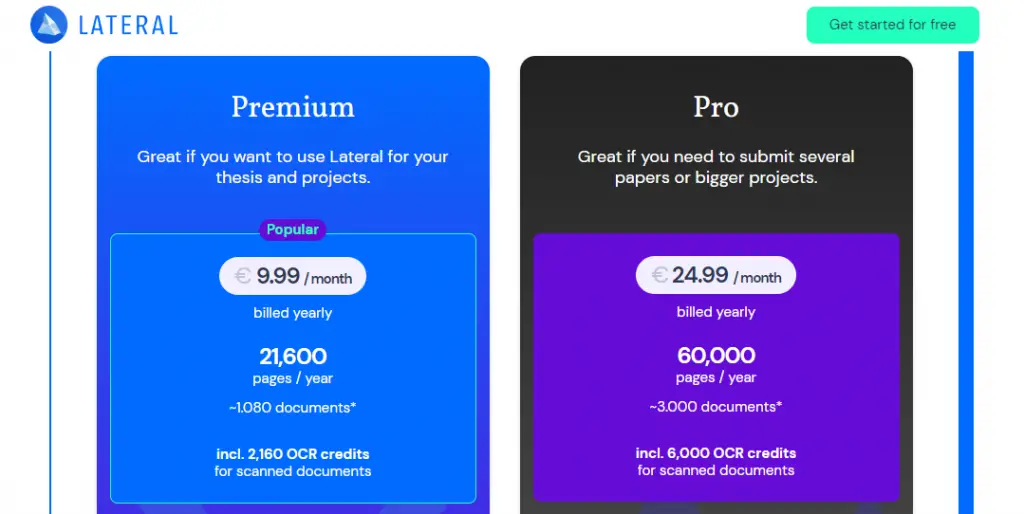
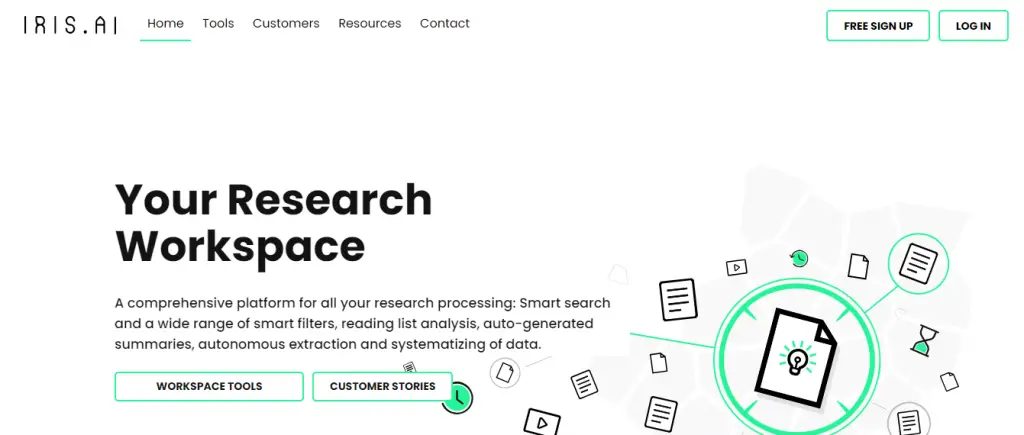
Iris AI is an innovative literature review tool that has transformed the research process for academics and scholars. With its advanced artificial intelligence capabilities, Iris AI offers a seamless and efficient way to navigate through a vast array of academic papers and publications.
Researchers are drawn to this tool because it saves valuable time by automating the tedious task of literature review and provides comprehensive coverage across multiple disciplines.
Its intelligent recommendation system suggests related articles, enabling researchers to discover hidden connections and broaden their knowledge base. However, caution should be exercised while using Iris AI.
While the tool excels at surfacing relevant papers, researchers should independently evaluate the quality and validity of the sources to ensure the reliability of their work.
It’s important to note that Iris AI may occasionally miss niche or lesser-known publications, necessitating a supplementary search using traditional methods.
Additionally, being an algorithm-based tool, there is a possibility of false positives or missed relevant articles due to the inherent limitations of automated text analysis. Nevertheless, Iris AI remains an invaluable asset for researchers, enhancing the quality and efficiency of their research endeavors.
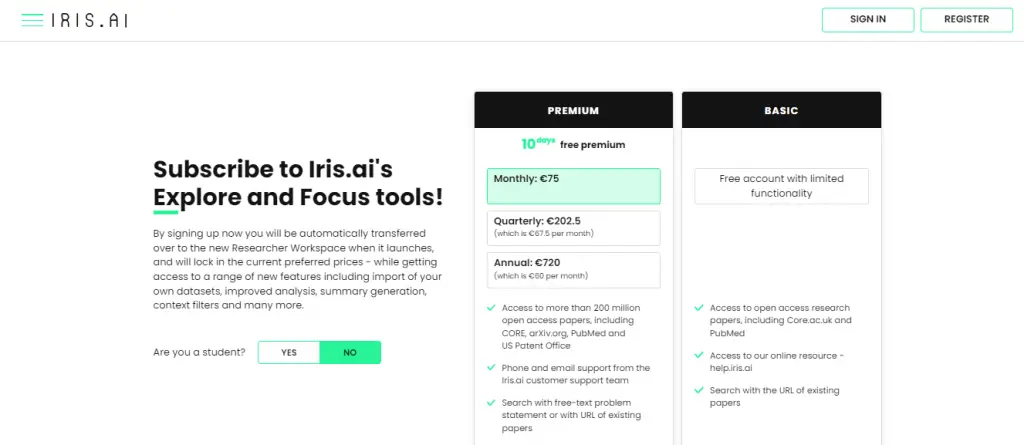
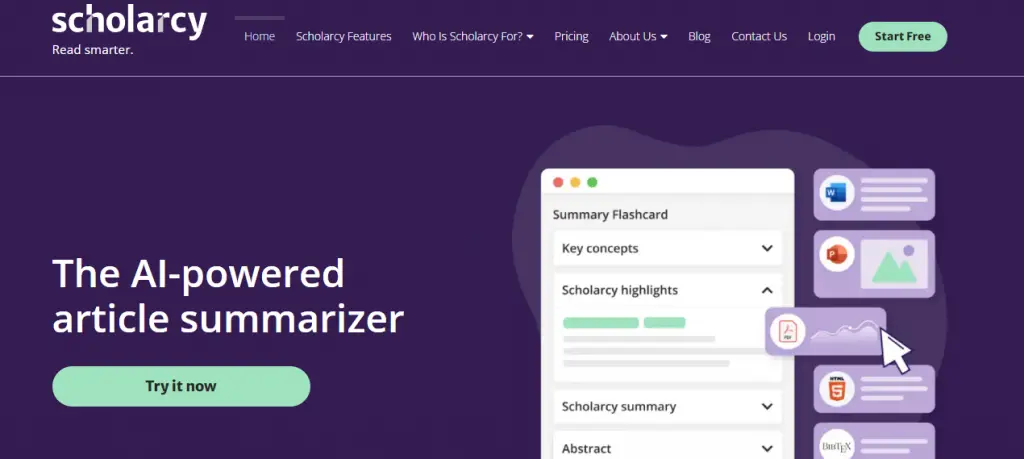
Scholarcy is a powerful literature review tool that helps researchers streamline their work. By employing advanced algorithms and natural language processing, it efficiently analyzes and summarizes academic papers, saving researchers valuable time.
Scholarcy’s ability to extract key information and generate concise summaries makes it an attractive option for scholars looking to quickly grasp the main concepts and findings of multiple papers.
However, it is important to exercise caution when relying solely on Scholarcy. While it provides a useful starting point, engaging with the original research papers is crucial to ensure a comprehensive understanding.
Scholarcy’s automated summarization may not capture the nuanced interpretations or contextual information presented in the full text.
Researchers should also be aware that certain types of documents, particularly those with heavy mathematical or technical content, may pose challenges for the tool.
Despite these considerations, Scholarcy remains a valuable resource for researchers seeking to enhance their literature review process and improve overall efficiency.

In conclusion, conducting a comprehensive literature review is a crucial aspect of any research project, and the availability of reliable and efficient tools can greatly facilitate this process for researchers. This article has explored the top 10 literature review tools that have gained popularity among researchers.
Moreover, the rise of AI-powered tools like Iris.ai and Sci.ai promises to revolutionize the literature review process by automating various tasks and enhancing research efficiency.
Ultimately, the choice of literature review tool depends on individual preferences and research needs, but the tools presented in this article serve as valuable resources to enhance the quality and productivity of research endeavors.
Researchers are encouraged to explore and utilize these tools to stay at the forefront of knowledge in their respective fields and contribute to the advancement of science and academia.
Literature review tools for researchers are software or online platforms designed to assist researchers in efficiently conducting literature reviews. These tools help researchers find, organize, analyze, and synthesize relevant academic papers and other sources of information.
When choosing literature review tools, researchers should consider factors such as the tool’s search capabilities, database coverage, user interface, collaboration features, citation management, annotation and highlighting options, integration with reference management software, and data extraction capabilities.
It’s also essential to consider the tool’s accessibility, cost, and technical support.
Yes, there are literature review tools that cater specifically to systematic reviews and meta-analyses, which involve a rigorous and structured approach to reviewing existing literature. These tools often provide features tailored to the specific needs of these methodologies, such as:
Screening and eligibility assessment: Systematic review tools typically offer functionalities for screening and assessing the eligibility of studies based on predefined inclusion and exclusion criteria. This streamlines the process of selecting relevant studies for analysis.
Data extraction and quality assessment: These tools often include templates and forms to facilitate data extraction from selected studies. Additionally, they may provide features for assessing the quality and risk of bias in individual studies.
Meta-analysis support: Some literature review tools include statistical analysis features that assist in conducting meta-analyses. These features can help calculate effect sizes, perform statistical tests, and generate forest plots or other visual representations of the meta-analytic results.
Reporting assistance: Many tools provide templates or frameworks for generating systematic review reports, ensuring compliance with established guidelines such as PRISMA (Preferred Reporting Items for Systematic Reviews and Meta-Analyses).
Yes, literature review tools often come equipped with features to help researchers organize and annotate collected references. Some common functionalities include:
Reference management: These tools enable researchers to import references from various sources, such as databases or PDF files, and store them in a central library. They typically allow you to create folders or tags to organize references based on themes or categories.
Annotation capabilities: Many tools provide options for adding annotations, comments, or tags to individual references or specific sections of research articles. This helps researchers keep track of important information, highlight key findings, or note potential connections between different sources.
Full-text search: Literature review tools often offer full-text search functionality, allowing you to search within the content of imported articles or documents. This can be particularly useful when you need to locate specific information or keywords across multiple references.
Integration with citation managers: Some literature review tools integrate with popular citation managers like Zotero, Mendeley, or EndNote, allowing seamless transfer of references and annotations between platforms.
By leveraging these features, researchers can streamline the organization and annotation of their collected references, making it easier to retrieve relevant information during the literature review process.